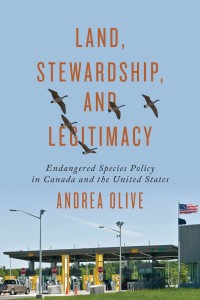
LAND, STEWARDSHIP, AND LEGITIMACY: ENDANGERED SPECIES POLICY IN CANADA AND THE UNITED STATES
Canada and the United States are similar in terms of the species of wildlife that mingle freely across their shared border. Despite this similarity, however, there are significant differences between approaches to wildlife management in these two nations. In Land, Stewardship, and Legitimacy, Andrea Olive examines the divergent evolution of endangered species policy on either side of the 49th parallel.
Examining local circumstances in areas as distant and diverse as southern Utah and the Canadian Arctic, Olive shows how public attitudes have shaped environmental policy in response to endangered species law, specifically the Species at Risk Act in Canada and the Endangered Species Act in the U.S. Richly researched and accessibly written, this is the first book to compare endangered species policy on both sides of the Canada–U.S. border. It will appeal to students and scholars of environmental policy, politics, and ethics, and anyone interested in current approaches to wildlife management.
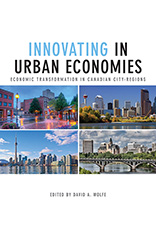
Innovating in Urban Economies: Economic Transformation in Canadian City-Regions
In a globalizing, knowledge-based economy, innovation and creative capacity lead to economic prosperity. Starting in 2006, the Innovation Systems Research Network began a six year-long study on how city-regions in Canada were surviving and thriving in a globalized world. That study resulted in the “Innovation, Creativity, and Governance in Canadian City-Regions” series, which examines the impact of innovation, talent, and institutions on sixteen city-regions across Canada. This volume explores how the social dynamics that influence innovation and knowledge flows in Canadian city-regions contribute to transformation and long-term growth.
With case studies examining cities of all sizes, from Toronto to Moncton, Innovating in Urban Economies analyzes the impact of size, location, and the regional economy on innovation and knowledge in Canada’s cities.
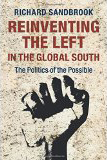
Reinventing the Left in the Global South: The Politics of the Possible
This book offers a fresh appraisal of the nature and significance of the democratic Left in the Global South. The moral and intellectual leadership of the Left is shifting south from its European birthplace. It is in the Global South, most notably in Latin America, that one finds newly self-confident progressive movements. This ‘new’ democratic Left includes parties and social movements that not only are avoiding the familiar pitfalls that ensnared socialists and social democrats in the twentieth century, but also are coping with the realities of the twenty-first century, especially neoliberal globalization. In analyzing and illustrating three innovative strategies – moderate social democracy, radical social-democratic transition to socialism, and Left populism – this study nudges the debate about the Left out of the well-worn grooves into which it has fallen in recent decades.
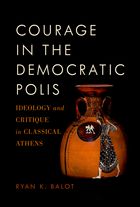
Courage in the Democratic Polis: Ideology and Critique in Classical Athens
In this compelling new study, Ryan K. Balot brings together political theory, classical history, and ancient philosophy in order to re-conceive of courage as a specifically democratic virtue. Ranging from Thucydides and Aristophanes to the Greek tragedians and Plato, Balot shows that the ancient Athenians constructed a novel vision of courage that linked this virtue to fundamental democratic
ideals such as freedom, equality, and practical rationality. The Athenian ideology of courage had practical implications for the conduct of war, for gender relations, and for the citizens’ self-image as democrats. In revising traditional ideals, Balot argues, the Athenians reimagined the emotional and cognitive motivations for courage in ways that will unsettle and transform our contemporary discourses. Without losing sight of political tensions and practical conflicts, Balot illustrates the merits of the Athenian ideal, provocatively explaining its potential to enlarge our contemporary understandings of politics and ethics. The result is a remarkably interdisciplinary work that has significant implications for the theory and practice of democracy, both ancient and modern.

Political Philosophy: What It Is and Why It Matters
What is political philosophy? Ronald Beiner makes the case that it is centrally defined by supremely ambitious reflection on the ends of life. We pursue this reflection by exposing ourselves to, and participating in, a perennial dialogue among epic theorists who articulate grand visions of what constitutes the authentic good for human beings. Who are these epic theorists, and what are their strengths and weaknesses? Beiner selects a dozen leading candidates: Arendt, Oakeshott, Strauss, Löwith, Voegelin, Weil, Gadamer, Habermas, Foucault, MacIntyre, Rawls, and Rorty. In each case, he shows both why the political philosophies continue to be intellectually compelling and why they are problematic or can be challenged in various ways. In this sense, Political Philosophy attempts to draw up a balance sheet for political philosophy in the twentieth century, by identifying a canon of towering contributions and reviewing the extent to which they fulfill their intellectual aspirations.
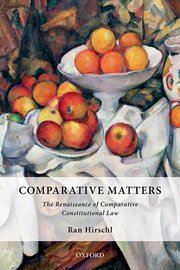
Comparative Matters: The Renaissance of Comparative Constitutional Law
Comparative study has emerged as the new frontier of constitutional law scholarship as well as an important aspect of constitutional adjudication. Increasingly, jurists, scholars, and constitution drafters worldwide are accepting that ‘we are all comparativists now’. And yet, despite this tremendous renaissance, the ‘comparative’ aspect of the enterprise, as a method and a project, remains under-theorized and blurry. In his new book Comparative Matters: The Renaissance of Comparative Constitutional Law (Oxford University Press, 2014), Ran Hirschl addresses this gap by charting the intellectual history and analytical underpinnings of comparative constitutional inquiry, probing the various types, aims, and methodologies of engagement with the constitutive laws of others through the ages, and exploring how and why comparative constitutional inquiry has been and ought to be pursued by academics and jurists worldwide.
Through an extensive exploration of comparative constitutional endeavours past and present, near and far, Hirschl shows how attitudes towards engagement with the constitutive laws of others reflect tensions between particularism and universalism as well as competing visions of who ‘we’ are as a political community. Drawing on insights from social theory, religion, history, political science, and public law, Hirschl argues for an interdisciplinary approach to comparative constitutionalism that is methodologically and substantively preferable to merely doctrinal accounts. The future of comparative constitutional studies, he contends, lies in relaxing the sharp divide between constitutional law and the social sciences.
Described as “a book of dazzling scope and depth” and “an instant classic”, Comparative Matters serves, as one reviewer puts it, “as a sharp reminder that comparative law, properly understood, is, can be and should be more than, yes, comparative law. It is a window to, and a tool for, an understanding of the political, the social, indeed, the human condition itself.”
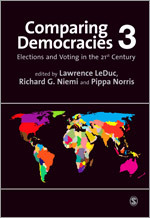
Comparing Democracies 3
The benchmark First and Second Editions of Comparing Democracies represented essential guides to the global study of elections. Reflecting recent developments in the field, this timely new edition gives an indispensable state-of-the art review of the whole field from the world’s leading international scholars. With a completely new thematic introduction which explores how democracy is built and sustained, thoroughly updated chapters (many of which are also new) , the Third Edition provides a theoretical and comparative understanding of the major topics related to elections and introduces important work on key new areas. Comparing Democracies, Third Edition will remain a must-read for students and lecturers of elections and voting behavior, comparative politics, parties, and democracy.
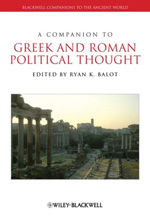
A Companion to Greek and Roman Political Thought
This volume comprises 34 essays from leading scholars in history, classics, philosophy, and political science to illuminate Greek and Roman political thought in all its diversity and depth. It offers a broad survey of ancient political thought from Archaic Greece through Late Antiquity. Approaching ancient political philosophy from both a normative and historical focus, this text examines Greek and Roman political thought within historical context and contemporary debate. It also explores the role of ancient political thought in a range of philosophies, such as the individual and community, human rights, religion, and cosmopolitanism.
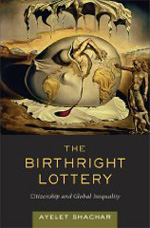
The Birthright Lottery: Citizenship and Global Inequality
In The Birthright Lottery, Ayelet Shachar argues that birthright citizenship in an affluent society can be thought of as a form of property inheritance: that is, a valuable entitlement transmitted by law to a restricted group of recipients under conditions that perpetuate the transfer of this prerogative to their heirs. She deploys this fresh perspective to establish that nations need to expand their membership boundaries beyond outdated notions of blood-and-soil in sculpting the body politic. Located at the intersection of law, economics, and political philosophy, The Birthright Lottery further advocates redistributional obligations on those benefiting from the inheritance of membership, with the aim of ameliorating its most glaring opportunity inequalities.
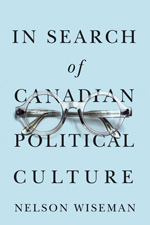
In Search of Canadian Political Culture
What do we really mean by phrases such as “western Canadian political culture,” “the centrist political culture of Ontario,” “Red Toryism in the Maritimes,” or “Prairie socialism”? What historical, geographical, and sociological factors came into play as these cultures were forged? In this book, Nelson Wiseman addresses many such questions, offering new ways of conceiving Canadian political culture.
The most thorough review of the national political ethos written in a generation, In Search of Canadian Political Culture offers a bottom-up, regional analysis that challenges how we think and write about Canada. It will interest specialists in Canadian political culture and generalists in Canadian politics.